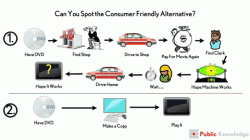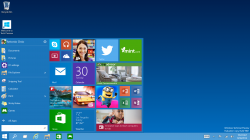Weekly News Roundup (9 November 2014)
Am I the only one who got pretty excited about the GTA V first person experience video? GTA V has always been a third person game, but adding a first person mode might elevate the game to a whole new level. I’m not sure the driving elements would be improved by a first person mode, but it would definitely make the shooting parts a whole new experience, and could make it rival other more well known FPS games. One more piece of evidence that the PS4/XB1/PC version of the game is going to be awesome.
Let’s get started with this week’s WNR.
![]()
If you can’t change them, erm, beat them? Could movie studios, tired of demanding Google “do the right thing” and start censoring its own search results for other’s commercial interests, start their own search engine instead? Disney’s latest patent seems to suggest so, although patents being what they are, it could all be fairly meaningless. Still, even if the studios had plans to launch their own search engine, who would actually use it? Especially when, based on the patent filings, the search engine will demote not only piracy sites, but also sites that aren’t owned by the studios themselves (including the IMDb and Wikipedia). It all seems a bit silly to me, but again a patent application could just be one of those things that you throw out there in the small chance that one day you might get something back from it, not a sign of any real intent to take on the likes of Google and, erm, Bing, I guess. Okay, I admit, they may have a shot at beating Bing, but you know, still kinda pointless.
——
It’s that time of the year again and the EFF has filed submissions for DMCA exemption, specifically exemptions for certain cases where removing DRM would, under current laws, be illegal. Yet all these cases would still fall under fair use. This conundrum comes via the fact that the DMCA has a specific clause that outlaws all DRM circumvention, regardless of whether it falls under fair use or not. This means the EFF and other groups like it have to apply for exemptions every year (since these exemptions expire), or otherwise the DMCA could be used to strip away consumer fair use rights by corporations intent on controlling everything.
New this year is in-car software and the DRM that comes along with that. If used maliciously, in-car DRM could prevent non authorised repair and modification, thus locking car owners to service centers owned by the car manufacturer or dealer.
The EFF also wants gamers to be able to hack old and abandoned games to make them playable, even if it means removing copyright protection. Games that require online interaction, for example, might need to be hacked to point to new unofficial servers to keep the game going, when the publisher has given up on it already.
While these two exemptions might be granted, there are a few submissions that are more pie-in-the-sky. Like the attempt to make DVD and Blu-ray ripping legal, or allowing the DRM of streaming service like Netflix to be circumvented. Don’t think this is going to happen, not if the MPAA has anything to say about it (and they do, via their own submissions).
But you never know, and I wish the EFF luck in their pursuit of (consumer) freedom.
While the EFF’s (and the MPAA’s) actions on changes to the DMCA are mostly public, what’s not so public are the MPAA’s lobbying efforts on lawmakers in Washington. While the law calls on the MPAA and other groups to disclose the general topics of their lobbying efforts, the exact nature and detail of their lobbying efforts do not have to be disclosed. But from the MPAA’s latest lobbying disclosure forms, we can see that they’ve been particularly busy trying talking to politicians on the issues of Net Neutrality and an Internet tax.
While we can’t actually confirm for sure the MPAA’s position on these issues, one can make quite an intelligent guess at just how the MPAA could benefit from these two issues. First for an Internet tax, the benefits are obvious, especially when you consider that the Internet tax is also sometimes known as a piracy tax. Imagine a tax of a dollar on every GB of data you download (regardless of whether the download was legal or not), with most of that money going to rights holders like the MPAA, could be a very easy way to get your claws into the new Net economy without actually having to innovate. All in the name of fighting piracy, of course.
As for Net Neutrality, imagine if ISPs were allowed to throttle down your BitTorrent traffic (or even Netflix), in favour of MPAA approved distribution methods like UltraViolet. Wouldn’t that be nice? And again, all in the name of fighting piracy, of course.
![]()
Windows 10 is set to be a lot more HD video friendly thanks to the announcement that it will have native MKV and HEVC support. Windows Media Player in Windows 10 will be able to handle these formats without the need to install third party codecs, which is a win for users, but perhaps more importantly, for the HEVC format (which seems to already have secured its status as the industry standard codec, despite HEVC downloads being relatively rare at the moment).
Those of us who want a little bit more control over just how we play our videos might still rely on codec packs, VLC, MPC-HC and other similar tools, but for many, being able to play a video without having to install anything will be very attractive.
![]()
Nintendo’s upcoming new 3DS console, schedule to be released in 2015, will still be region-locked. But to be fair, Nintendo did offer a pretty good explanation as to why region-locking is still needed today. In short, it’s more to do with marketing, licensing and localisation. Now, you may not believe this excuse, but Nintendo did offer a glimpse of hope by acknowledging that region-free is good for the consumer, and also be a benefit to themselves. But until the aforementioned problems gets solved, the new 3DS remain region-locked.
The Xbox One is already getting a temporary $50 discount for the holidays, but a permanent discount may also be on the way once Microsoft moves from its APU from a 28nm process to a 20nm one. In other words, once Microsoft can reduce the sizes of its processor, it could also reduce power requirements, which also means reductions to heat management – all of this will eventually lead to a “Xbox One Slim”, which will probably be cheaper to manufacture and be more efficient at the same time.
With that said, Sony will be working on something similar as well. So it bodes well for gamers. Both the PS4 and Xbox One are terrific value already, so cheaper versions will be even better!
——
I think that’s it for this week. See you again soon.



